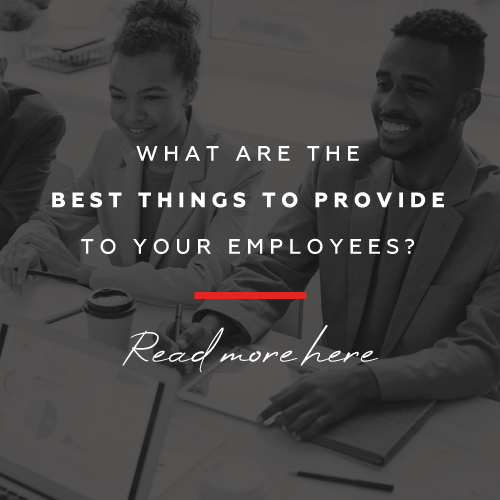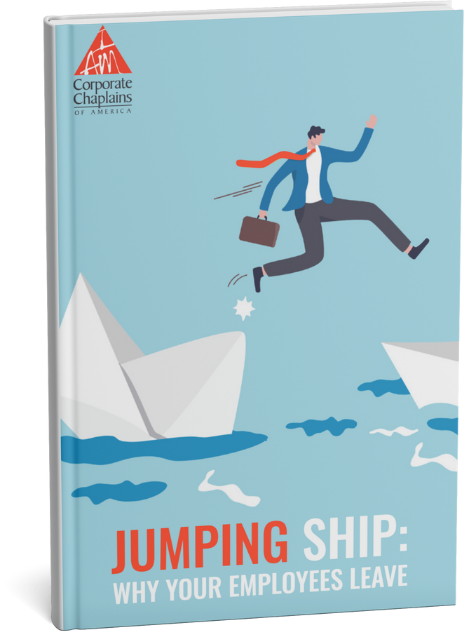
What Are the Best Employee Benefits for Small Companies?
By Steve Magento, CCA Contributor
There are many reasons I love small companies. From the incredibly dedicated, talented people to the sense of purpose I get each day knowing I’m building something with my colleagues. Small companies often have a sense of teamwork corporations lack, and it’s knowing your efforts really make a difference that can stop you from feeling like just another cog in the wheel.
But there’s one thing I dislike about small companies, and that’s their small benefits packages.
With small businesses, there are a lot of unique challenges, namely being able to provide the same level of benefits as a corporation or enterprise. Big businesses have the money to do the talking, which is why smaller organizations tend to focus on perks like work flexibility, pet-friendly offices, and even laptops for remote workers.
Let’s back pedal for a minute and consider what I was looking for when I was comparing job opportunities. There were three job offers on my plate, two with large companies and one with a small startup. The first two businesses had between 250 and 1,000 employees. The startup had 25.
What made me decide to go with the smallest group out of the bunch? It wasn’t because they had a strong track record, or I knew they were going to do big things in the future. Taking the job was a risk, but it was worth it. And part of the reason why were the hand-selected benefits their founder offered.
Job Benefits Small Business Employees Need
It’s important to avoid falling into the trap of just offering what everyone else is. Yes, there are staples every employee cares about, but there are also additional benefits not considered the norm that make an enormous difference in a worker’s life.
Let’s walk through each benefit, along with why it matters and the value it brings to an employee. I’ll also let you know, from a jobseeker’s perspective, why these benefits were considered valuable.
Health Insurance
We all know how stressful health insurance in America is. People rely on their jobs most of the time to make healthcare affordable for them and their families. With 79 million Americans struggling with medical bills or debt, there is nothing more important than offering them some type of security through your organization.
Here’s what you should consider as you’re looking for coverage options:
- If you can afford to cover the entire plan for the employee, that’s great. But it isn’t the most important factor.
- What we really want are options. Being able to choose our own providers and knowing we have access to specialists when we need them.
- Costs should be balanced. Some employee-sponsored plans have such high deductibles and co-pays we might as well be paying out of pocket.
- Variety matters. A combined health, vision, and dental plan offers greater security to an employee.
I know that companies need to consider their bottom line, but so do employees. For us, it’s not only our salaries. It’s our health, housing, retirement savings, and opportunities to better ourselves.
We don’t just turn to employers to earn a living. We come to them to give us the platform to support our entire lives.
This is why I looked closely at the health benefits package on offer by my employer. It was clear that while they were a small company, they weren’t interested in cutting corners that jeopardized someone’s financial and medical stability.
Worker’s Compensation
While workers’ compensation laws vary by state, small businesses typically need a policy in place as soon as they hire their first employee. In most states, workers’ compensation insurance usually isn’t optional.
Accidents on the job happen, and it’s nice to know that there’s protection in place if one occurs. Policies for worker’s compensation offer wage replacement as well as coverage for medical bills and work rehabilitation. What really mattered to me was knowing that my employer thought ahead and wanted to have provisions in place if I ever needed them.
401(k) Plans
Next to health insurance, retirement savings are one of the biggest financial hurdles for American workers. Nearly half of us aren’t saving enough to comfortably retire. With the cost of living continually rising, that means Social Security benefits won’t be enough to relieve us of working through our 70s.
A 401(k) makes saving easier because we get to decide how much we automatically contribute from every paycheck. This also comes with a tax deduction. As an employer, you also qualify for tax credits by offering retirement plans.
Something that really won me over at my current job was their employer-match to my contributions. Which, by the way, is tax-deductible for them, too.
Identity Theft Protection
As we become more reliant on technology, our risks exponentially increase. Identity theft causes $50 billion in financial losses every year, and affects 15 million Americans. Criminals are getting more sophisticated, so should our protection.
My employer offered identity theft protection through Norton LifeLock. Norton continually reviews the use of my name, Social Security number, credit cards, birthdate, and address. If there are ever any causes for alarm, I get instant text messages and email alerts.
This is often a voluntary benefit that employers offer today. For me, I found this a major perk because it alleviated some of the stress I’d face managing these threats on my own.
Paid Maternity/Paternity Leave
When my wife was pregnant with our first child, the thought of having to leave her at home with our newborn was depressing. Dads want to bond with their babies just as much, and they play an important part in the early days of a child’s life. They pitch in and support their partners, deliver much-needed reprieve, and make all those sleepless nights a little easier with feedings and diaper changes.
As I was job searching, finding a company that offered paid leave for new parents was important to me. I was willing to even accept fewer weeks off as the non-birthing parent. Imagine how happy I was to discover the startup not only had paternity leave, but it was also 8-weeks long.
Getting to spend the first 2 months of my son’s life with him every day was invaluable.
A Chaplain
When I saw that my company offered the services of a chaplain, I thought it unusual and over the course of the first few months, I didn’t feel I needed him. But he was there, week after week checking in with the entire team. But when our OB/GYN began expressing concern about the health of our baby, our world came crashing down. Our chaplain reached into our lives and cared stayed close to us during those frightening days. My wife would say he was a buoy in a sea of hopelessness. He was even at the hospital the day our baby was born!
It will never be lost on me that my company provided someone to help us navigate this difficult time in our lives. It is an unusual benefit, but one I’ve seen so many of our team utilize as they have navigated an illness, death of a family member or a divorce. I’ve seen our Chaplain coach our team through some difficult times, just like they did for my wife and I.
Not All Benefits Have to Cost a Fortune
While many businesses focus solely on expensive benefits and how it affects them, there are many other benefits that are low-cost or free. These benefits shape the entire employee experience and company culture.
Here are some other perks I’ve come across over my career. My advice to any business owner would be to consider what type of environment you want to create. What are your values, and how do your benefits elevate them?
- Paid-time-off (PTO) for sick days and vacation days
- Remote working options
- Flexible work schedules, with late-starts weekend hours
- Coaching (financial, mental health, life)
- Professional development courses paid for or reimbursed
- Dog-friendly office spaces
- Gym memberships
- Quarterly Amazon book stipend
- Childcare benefits
- Student loan debt assistance
- Sign-on bonuses
- Short-term disability insurance
Some of these aren’t included in my workplace, and I wish they were.
Choosing the Right Benefits for Your Small Company
Every business works differently, and we know that cultures vary greatly even among companies in the same industry. I’d suggest you start by determining what matters most to the people you employ.
Some employees make a generic list of typical benefits and stop there. They figure, “No one’s complaining, so everything must be fine.” But that isn’t always the case.
It’s not likely someone will knock on their employer’s door and say, “I appreciate the health insurance, but have you thought about letting me work from home?”
An anonymous internal survey could help shed light on what benefits people want the most. I say anonymous because it isn’t necessarily comfortable to voice what you’re unhappy with, even if you love your job.
The focus isn’t to determine what’s missing so much as what could be gained. Sometimes, simple organizational changes can lead to major benefits for an employee. For example, letting teams discuss their latest projects over a paid lunch can lower stress and even help improve collaboration.
The Bottom Line
People work their best when they’re their happiest. As their employer, you should put their well-being first. Creating a positive work environment is more than just covering basic health insurance and retirement accounts; it’s being responsive to your employees’ needs and ever-changing lives.
I know that from a financial standpoint, some benefits won’t be possible for a small business. But don’t shy away from growth, either. As your company becomes more profitable and your team grows, you should revisit your benefits package and consider expanding it for everyone.




